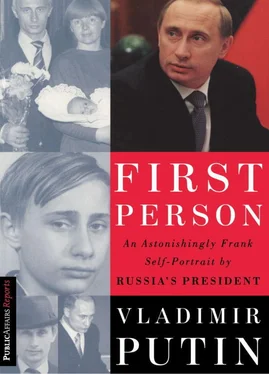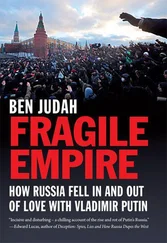Vladimir Putin - First Person
Здесь есть возможность читать онлайн «Vladimir Putin - First Person» весь текст электронной книги совершенно бесплатно (целиком полную версию без сокращений). В некоторых случаях можно слушать аудио, скачать через торрент в формате fb2 и присутствует краткое содержание. Город: New York, Год выпуска: 2000, ISBN: 2000, Издательство: PublicAffairs, Жанр: Биографии и Мемуары, Политика, Политика, Публицистика, на английском языке. Описание произведения, (предисловие) а так же отзывы посетителей доступны на портале библиотеки ЛибКат.
- Название:First Person
- Автор:
- Издательство:PublicAffairs
- Жанр:
- Год:2000
- Город:New York
- ISBN:978-0-786-72327-0
- Рейтинг книги:3 / 5. Голосов: 1
-
Избранное:Добавить в избранное
- Отзывы:
-
Ваша оценка:
- 60
- 1
- 2
- 3
- 4
- 5
First Person: краткое содержание, описание и аннотация
Предлагаем к чтению аннотацию, описание, краткое содержание или предисловие (зависит от того, что написал сам автор книги «First Person»). Если вы не нашли необходимую информацию о книге — напишите в комментариях, мы постараемся отыскать её.
First Person — читать онлайн бесплатно полную книгу (весь текст) целиком
Ниже представлен текст книги, разбитый по страницам. Система сохранения места последней прочитанной страницы, позволяет с удобством читать онлайн бесплатно книгу «First Person», без необходимости каждый раз заново искать на чём Вы остановились. Поставьте закладку, и сможете в любой момент перейти на страницу, на которой закончили чтение.
Интервал:
Закладка:
“It’s all arranged,” he said. “Volodya, there’s still a lot of time, but how would you feel if you were invited to work in the agencies?”
I didn’t tell him that I had dreamed of this moment since I was a schoolboy. I didn’t tell him, because I remembered my conversation in the KGB office long ago: “We don’t take people who come to us on their own initiative.”
And when you agreed to work in the agencies, did you think about 1937?
To be honest, I didn’t think about it at all. Not one bit. I recently met up with some old colleagues from the KGB Directorate—guys who I worked with at the very beginning—and we talked about the same thing. And I can tell you what I said to them: When I accepted the proposition from the Directorate’s personnel department (actually, my recruiter turned out to be an official in the subdivision that served the universities), I didn’t think about the [Stalin-era] purges. My notion of the KGB came from romantic spy stories. I was a pure and utterly successful product of Soviet patriotic education.
You knew nothing about the purges?
I didn’t know much. Yes, of course, I knew about Stalin’s cult of personality. I knew that people had suffered and that the cult of personality had been dismantled…. I wasn’t completely naïve. Keep in mind that I was 18 when I went to university and that I graduated at age 23.
But those who cared to know, knew all about it.
We lived under the conditions of a totalitarian state. Everything was concealed. How deep was that cult of personality? How serious was it? My friends and I didn’t think about that. So I went to work for the agencies with a romantic image of what they did.
But after that conversation in the vestibule, I heard nothing more. The man disappeared. And then there was a phone call; an invitation to the university’s personnel department. Dmitry Gantserov—I can still remember his name—was the one to speak to me.
But there was almost a slipup at the employment commission. When they got to my name, a representative from the department of law said, “Yes, we’re taking him into the bar.” Then the agent who was monitoring the students’ assignments suddenly woke up—he had been asleep somewhere in the corner. “Oh, no,” he said. “That question has already been decided. We’re hiring Putin to work in the agencies of the KGB.” He said it right out loud like that, in front of the job-assignment commission.
And then several days later I was filling out all sorts of application forms and papers.
They told you they were hiring you to work in intelligence?
Of course not. It was all very systematic. They put it sort of like this: “We are proposing that you work in the field where we’ll send you. Are you ready?” If the applicant was wishy-washy and said that he had to think about it, they would simply say, “Okay. Next!” And that person wouldn’t have another chance. You can’t pick your nose and say, “I want this and I don’t want that.” They can’t use people like that.
You evidently said you were ready to work where they sent you?
Yes. Of course. And they themselves didn’t even know where I would be working. They were just hiring new people. It’s actually a routine matter, recruiting personnel and determining who should be sent where. I was made a routine offer.
Sergei Roldugin:
Vovka told me right away that he was working in the KGB. Practically right away. Maybe he was not supposed to do that. He told some people that he was working in the police. On the one hand, I treated these guys with caution, because I had had some run-ins with them. I had traveled abroad and knew that there were always people posing as inspectors or officials from the Ministry of Culture. You had to keep your mouth shut when you were around them.
I once told a colleague of mine, “Come on, they’re normal, they’re nice guys.” And he said, “The more you talk to them, the more dirt they will have in your file at 4 Liteiny Street.” [5] 4 Liteiny Street was the address of the KGB headquarters in Leningrad and currently houses the KGB’s successor, the FSB (Federal Security Service).
I never asked Volodya about his work. Of course I was curious. But I remember once I decided to corner him and find out something about some special operation. I got nowhere.
Later I said to him, “I am a cellist. I play the cello. I could never be a surgeon. Still, I’m a good cellist. But what is your profession? I know, you’re a spy. I don’t know what that means. Who are you? What do you do?”
And he said to me, “I’m a specialist in human relations.” And that was the end of our conversation. And he really did think that he was able to judge personalities. When I divorced my first wife, Irina, he said, “I predicted that that’s exactly how it would turn out.” I disagreed—you couldn’t know what would happen between me and Irina from the start. But his comment made a big impression on me. I believed what he said: that he was a specialist in human relations.
Part 4
THE YOUNG SPECIALIST
After a stint in counterintelligence with some stodgy hard-liners, Putin is sent to the Andropov Red Banner Institute in Moscow for additional training. The officers quickly take notice of the smart and unflappable trainee. He’s offered a spot in the most coveted of divisions: foreign intelligence. Meanwhile, he meets a stunning airline stewardess, Lyudmila. He impresses her with hard-to-come-by tickets for three nights at the theater, procured through his KGB connections. Their courtship lasts three years. They marry and are transferred on Putin’s first assignment abroad: Dresden, East Germany.
At first they assigned me to the Secretariat of the Directorate, and then to the counterintelligence division, where I worked for about five months.
Was it like you imagined it would be? What you were expecting?
No, of course it wasn’t what I had imagined. I had just come from university, after all. And suddenly I was surrounded by old men who had been in their jobs during those unforgettable times. Some of them were just about to go into retirement.
One time a group was drafting a scenario. I was invited to join the meeting. I don’t remember the details, but one of the veteran agents said that the plan should be followed in such-and-such a way. And I piped up: “No, that’s not right.” “What do you mean?” he said, turning to me. “It’s against the law,” I said. He was taken aback. “What law?” I cited the law. “But we have instructions,” he said. Once again I cited the law. The men in the room didn’t seem to understand what I was talking about. Without a trace of irony, the old fellow said, “For us, instructions are the main law.” And that was that. That’s how they were raised and that’s how they worked. But I simply couldn’t do things that way. And it wasn’t just me. Practically all my peers felt the same way.
For several months I went through the formalities and knocked off some cases. I was sent to agent training for six months. Our school in Leningrad wasn’t too exceptional. My superiors believed I had mastered the basics but that I needed some field preparation. So I studied in Moscow, and then came back to Petersburg for about half a year in the counterintelligence division.
What year was this?
What year? It was at the end of the 1970s. Now people say that was when Leonid Brezhnev was beginning to tighten the screws. But it was not very noticeable.
Did you join the Communist Party while you were at the KGB?
To join the intelligence service, you had to be a party member. There were no exceptions. That rule made for some strange episodes. For instance, if a person had worked in a security unit for less than a year and was transferred to another unit. In the interim period, he grew out of Komsomol age. It was impossible to admit him to the party because nobody could give him a recommendation. To receive a recommendation, you had to have worked with a unit for at least a year. Nobody knew this person for a period longer than a year, so nobody could recommend him for party membership. He was ineligible for the Komsomol because of his age and he couldn’t be admitted to the party. An intelligence man has to be a party member, so he was dismissed from the security service. It’s ridiculous, but it’s true.
Читать дальшеИнтервал:
Закладка:
Похожие книги на «First Person»
Представляем Вашему вниманию похожие книги на «First Person» списком для выбора. Мы отобрали схожую по названию и смыслу литературу в надежде предоставить читателям больше вариантов отыскать новые, интересные, ещё непрочитанные произведения.
Обсуждение, отзывы о книге «First Person» и просто собственные мнения читателей. Оставьте ваши комментарии, напишите, что Вы думаете о произведении, его смысле или главных героях. Укажите что конкретно понравилось, а что нет, и почему Вы так считаете.












